Powwow primer
Yes, you're invited. Here's what to expect and why you should go.
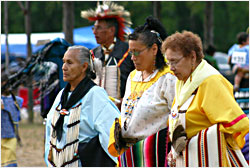
© Beth Gauper
Until the first Bemijigamaag Powwow, many community leaders in the northern Minnesota town of Bemidji had never been to a powwow.
"They said, 'Oh, that's a Native American thing, that's their thing," said organizer Darrell Kingbird. "They said, 'I never knew I could come to one.' "
But the powwow's tradition of welcoming outsiders is an old one. It's a family reunion, and the one concept central to the Ojibwe and Dakota world view is this: We are all related.
So the three largest Ojibwe bands in northern Minnesota invited the locals as well as the governor, and they came. The next year, the bands invited the entire Minnesota Legislature to their April powwow.
"We opened a lot of doors and healed a lot of stereotypes," Kingbird said.
Meeting the neighbors
For indigenous people, a powwow — or wacipi, as the Dakota often call them — is a social gathering, a time to greet old friends, replenish a sense of cultural identity and show off achievements.
For non-Indians, it's a window into a culture rich with nature-based spirituality and symbolic meaning.
When Europeans arrived in the New World, it was not an untouched wilderness. The Dakota and Ojibwe lived there and cared for the land as stewards, not owners. For them, it already was the land of the free.
Their culture has much to offer. Luckily, they're happy to share.
Learning to listen
But it's not always easy for non-Indians to absorb the lessons.
A powwow can be a little like a Magic Eye puzzle: There's a swirl of colors and a lot to look at, but it's hard for the eye to grasp the whole picture. That is, if the eye belongs to a person whose knowledge of Indians comes mainly from history books.
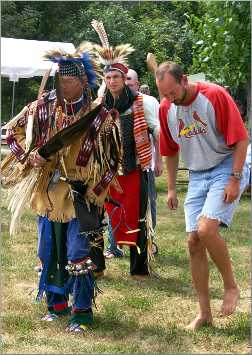
© Beth Gauper
"It's such a different culture," says public-television producer Barbara Wiener, who spent a year researching her documentary "Wacipi-PowWow." "It's so shocking — you feel like you've stepped into a different country."
At all powwows, the dancing celebrates each man and woman's artistry, spirituality and connection to ancestors, community and family.
"You're not just dancing for yourself, you're dancing for the stars, the moon, the plants, the animal people and for the ones who can't walk," says Darrell Kingbird.
Some powwows are competitions, with cash prizes awarded to the best dancers and sometimes drummers. Others are traditional, more like a family reunion.
A powwow in Mankato
The Mdewakanton Mah-kato Wacipi in Mankato, held every September, is a traditional powwow, one of the most meaningful in the Midwest.
It honors the 38 Dakota warriors hanged nearby in 1862, still the largest mass execution in the United States. Even today, emotions remain raw.
As the afternoon sun beat down on Land of Memories Park, the drumming began.
Into a circle ringed by bleachers came dancers carrying sacred eagle staffs. Other dancers carried flags, one honoring the military veterans who are venerated in Indian culture.
One of the first things visitors will notice is the many ways in which veterans are honored. Despite their history with the U.S. government, Indians take great pride in serving their country, and their young people have a long record of valiant service.
The second thing they'll notice is how revered the elders are, and how treasured are the children, who are full participants in the day.
After the honor dancers come the men's traditional dancers, wearing turkey-feather bustles and perhaps a bone breastplate, using a controlled, heel-to-toe step.
Then came the fancy dancers, in a whirl of color and spinning leaps; the grass dancers, with streamers swaying; and the young women in jingle dresses.
It was the second year I'd attended. Even so, as I watched the proceedings and listened hard to the voices crackling over the PA, I could hear Sherlock Holmes' admonishment to the dim-witted Watson echoing in my ears: "You see, but you do not observe."
In time, says Barbara Wiener, the many facets of Indian culture reveal themselves to those who relax their reliance on Western thinking.
"The more powwows you go to, the more you know and the more respectful you are in terms of listening, and if you listen, you will get it," she says. "Now, I can't imagine a summer without going to several."
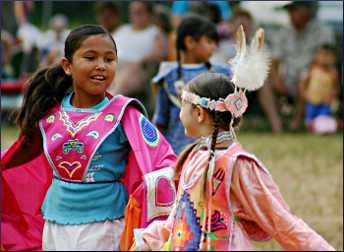
© Beth Gauper
Powwow etiquette
Like most festivals, powwows include food and craft booths and, sometimes, children's games and learning tents.
The centerpiece is the Grand Entry; most are 1 p.m. Saturdays and Sundays and 7 p.m. Saturdays. Guests should stand during the Grand Entry and honor songs. Listen to the announcer, who will give instructions.
Don't enter the dance circle unless invited. When you are invited, don't feel you have to dance a certain way or wear anything special; your hosts will not judge you.
Refer to regalia or outfits, not "costumes."
Don't take photos of the dancing when the announcer forbids it, and don't take photos of individuals without asking permission.
Do ask questions. Traditionally, friends and guests brought tobacco to honor favorite dancers and ask advice from elders, and some may still appreciate this.
Where to find a powwow
Check with each nation to find out details. Often, the most specific information will be on Facebook pages.
Below is a guide to some of the larger powwows. Since many of the participants travel from a long distance, holiday weekends are a favorite time to hold a powwow.
To find other powwows, check the Crazy Crow powwow calendars for Minnesota, Wisconsin, Michigan and Iowa. It also lists powwows elsewhere around the United States and Canada.
For more about the Upper Sioux Community wacipi (pronounced wah-CHEE-pee) in Minnesota, see Dancing on the Yellow Medicine.
For more places to learn about the culture, see Heritage travel: Dakota and Ojibwe.
For more about the history of the local indigenous people, see Ojibwe or Chippewa, Dakota or Sioux?
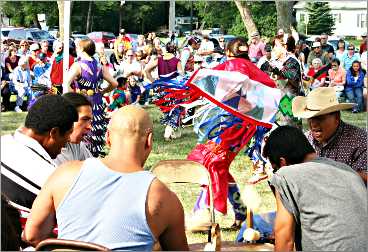
© Beth Gauper
Memorial Day weekend
Ho-Chunk Nation Memorial Day competition powwow in Black River Falls, two miles east of Majestic Pines casino on Wisconsin 54. For more about the area, check Black River Country tourism.
Leech Lake Band of Ojibwe traditional powwow in Cass Lake, Minn., at the Palace Casino powwow grounds. For more, check Cass Lake tourism.
Memorial Day Powwow at Mille Lacs Indian Museum near Onamia, Minn.
Red Lake Band of Chippewa powwow at Seven Clans Casino in Thief River Falls, Minn.
June
White Earth Reservation traditional powwow in White Earth, Minn.
Sault Tribe of Chippewa Indians Powwow in Manistique, Mich.
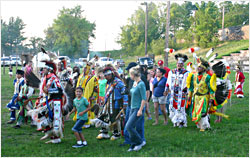
© Beth Gauper
Lower Sioux Community Wacipi in Morton, Minn., near Redwood Falls, traditional.
Mille Lacs Band of Ojibwe Grand Celebration powwow at Grand Casino in Hinckley, Minn.
Bois Forte Band of Chippewa Lake Vermillion traditional powwow on Lake Vermillion near Ely, Minn.
St. Croix Chippewa competition powwow in Turtle Lake, Wis.
Oneida Nation Powwow in Oneida, Wis., near Green Bay, competition.
Fourth of July weekend
Red Cliff Band of Lake Superior Chippewa traditional powwow near Bayfield, Wis.
Leech Lake Band of Ojibwe traditional powwow in Cass Lake, Minn.
Little River Band of Ottawa Indians contest powwow in Manistee, Mich.
July
Sault Tribe of Chippewa Indians Powwow and Summer Gathering in Sault Ste. Marie, Mich.
Lac du Flambeau Band of Lake Superior Chippewa Bear River traditional powwow in Lac du Flambeau, Wis.
Prairie Island Indian Community Wacipi near Red Wing, Minn.
Fond du Lac Band of Lake Superior Chippewa Veterans Powwow, Cloquet, Minn.
Lac Courte Oreilles Band of Ojibwe Honor the Earth Powwow near Hayward, Wis.
August
Menominee Indian Tribe of Wisconsin contest powwow in Keshena, Wis., northwest of Green Bay.
Grand Portage Band of Lake Superior Chippewa traditional powwow in Grand Portage, Minn. With the rendezvous at adjoining Grand Portage National Monument, this is a large event; plan a year in advance.
Mille Lacs Band of Ojibwe Traditional Powwow at the powwow grounds, near Onamia, Minn.
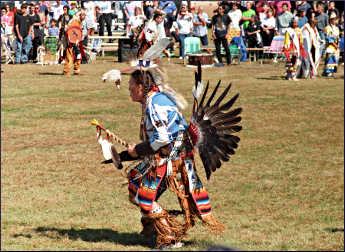
© Beth Gauper
Little Traverse Bay Bands of Odawa Indians Homecoming Powwow in Harbor Springs, Mich.
Shakopee Mdewakanton Sioux Community Wacipi in Prior Lake, Minn.
Grand Traverse Band of Ottawa and Chippewa Indians Peshawbestown Traditional Pow Wow between Northport and Suttons Bay on Michigan's Leelanau Peninsula.
Bad River Band of Lake Superior Tribe of Chippewa Indians traditional powwow in Odanah near Ashland, Wis.
St. Croix Chippewa Wild Rice Fest traditional powwow in Danbury, Wis.
Labor Day weekend
Leech Lake Band of Chippewa traditional powwow in Cass Lake, Minn.
Ho-Chunk Nation Labor Day Day competition powwow in Black River Falls, two miles east of Majestic Pines casino on Wisconsin 54.
September
Mendota Mdewakanton Dakota Welcome Home traditional powwow in Mendota, Minn., on the Minnesota River between Minneapolis and St. Paul.
Mahkato traditional wacipi, Mankato, Minn., in Land of Memories Park.
October
Winona-Dakota Gathering & Powwow in Winona, Minn., in Unity Park on Lake Winona.
Harvest Pow Wow at the DuPage County Fairgrounds in Wheaton, Ill., sponsored by the Midwest SOARRING Foundation.